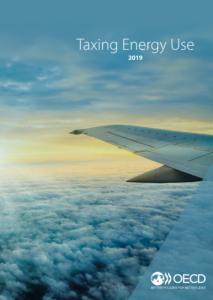Taxing polluting sources of energy is an effective way to reduce emissions that damage the planet and human health, while the income generated can be used to ease the low-carbon transition for vulnerable households. However, 70% of energy-related CO2 emissions from advanced and emerging economies are untaxed, a new OECD report says.
A preview of Taxing Energy Use 2019 indicates that for 44 countries accounting for more than 80% of energy emissions, taxes on polluting sources of energy are not anywhere near the necessary levels to reduce the risks and impacts of climate change and air pollution.
[smlsubform prepend=”GET THE SAFETY4SEA IN YOUR INBOX!” showname=false emailtxt=”” emailholder=”Enter your email address” showsubmit=true submittxt=”Submit” jsthanks=false thankyou=”Thank you for subscribing to our mailing list”]
Namely, taxes on coal are zero or close to zero in most countries, while taxes are often higher on natural gas, which is cleaner. As far as international flights and shipping are concerned, fuel taxes are zero.
We know we need to burn less fossil fuel, but when taxes on the most polluting fuels are zero or close to zero, there is little incentive to change. Energy taxes are not the sole solution, but we can’t curb climate change without them. They should be applied fairly and used to improve well-being and ease the energy transition for vulnerable groups
explains OECD Secretary-General Angel Gurría.
The report studied 44 countries, in which 97% of energy-related CO2 emissions outside of road transport are taxed far below levels that would reflect damage to the environment. In fact, only four countries (Denmark, the Netherlands, Norway and Switzerland) tax non-road energy more than EUR 30/t CO2. What is more, some countries have even reduced energy taxes in recent years.
According to OECD adjusting taxes, along with state subsidies and investment, is crucial to encourage a shift to low-carbon energy, transport, industry and agriculture. Considering the difficulties of making big changes without hurting industries or communities, a new strand of OECD work presents how factoring in possible synergies and trade-offs between emission reduction goals and broader societal objectives can increase the incentives for swift action to cut emissions.
Namely, a new OECD analysis that will be presented next week says that focusing on targets like clean air, healthy eating, accessibility of services and employment and inclusive fiscal reform could facilitate the introduction of changes changes that will end up accelerating the low-carbon transition while improving lives.
In addition, while energy taxes are stable, the 2019 OECD Inventory of support for fossil fuels found that government support for fossil fuel production and use in the 44 countries studied was USD 140 billion in 2017, with subsidies increasing in some countries.
However, the report pinpoints that governments must make sure that tax rises from tax reforms will not impact vulnerable households, firms or workers. Extra tax revenues can also be used for social purposes, like lowering income taxes, growing spending on infrastructure or health, or funding direct transfers to households.
You may see more details in the following PDF





























































